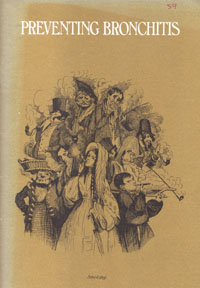Sign up to our newsletter Subscribe
Understanding societal preferences for priority by disease severity in England & Wales

In 1808 Charles Badham adopted the term ‘bronchitis’ to define collectively ‘chronic pectoral (chest) complaints, especially those of people advanced in life . . . ‘ This definition is of relevance today in that it serves to illustrate the wide range of morbid…
In 1808 Charles Badham adopted the term ‘bronchitis’ to define collectively ‘chronic pectoral (chest) complaints, especially those of people advanced in life . . . ‘ This definition is of relevance today in that it serves to illustrate the wide range of morbid states that bronchitis may encompass and hence the likelihood that most people will experience, at one time or another, some of the symptoms of a bronchitic ailment. Such illnesses may occur either in the form of acute, usually periodic attacks or as chronic afflictions which often become progressively more serious over time. Chronic bronchitis, which is widely known as the English disease, is the main concern of this paper.
The effects of the condition on individual sufferers range from minor and transient inconvenience, through varying levels of handicap in every-day life to severe distress which in some cases ultimately leads to death. In fact it causes around 30,000 fatalities a year in the UK, a number which although significant in itself is relatively small compared to the million or more people in the population who have chronic bronchitis. One person in every 20 consults a family doctor about a bronchitic complaint of some kind during the course of each year whilst one day in every 10 of sickness absence from work is classified as being due to bronchitis. In 1974 the treatment of bronchitic conditions cost the NHS approximately £100 million whilst the economic burden they placed on the community in terms of lost production was probably of the order of £250 million.
The occurrence of bronchitis is associated with the exposure of individuals to a variety of factors. The most significant of these appears to be cigarette smoking, with smaller but important contributions from dusty occupations, the climate and air pollution. In the context of the latter causes the incidence of bronchitis has often been regarded as an unfortunate but inevitable consequence of economic development and industrial advance. Further, its importance has often been over-shadowed by that of other, more dramatically destructive complaints. Throughout much of this Century, for example, respiratory tuberculosis occupied a large part of the effort and attention of the health services whilst today lung cancer holds a similarly dominant position. Even now some people tend to underestimate the impact of bronchitic illness on the community and to regard it as a natural consequence of ageing.
This paper, however, emphasises the extent to which such conditions, particularly chronic bronchitis, may be prevented by the control of factors associated with respiratory disorder, in particular cigarette smoking. It also describes the progressive nature of bronchitis, its causes and its social and economic costs and reviews the techniques employed in its treatment.
Preventing Bronchitis
